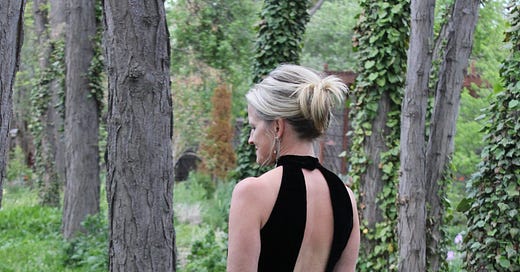"When I play the violin sometimes it feels like every hair is on end. It transports me. It's like the rest of the world is not even there. That moment of sharing the music--there's no way to describe it."
This is musician Mindy Gosswiller talking about her craft. She's most drawn, she says, toward working with children and the elderly: "That's where I feel called to serve. I think it's magical when you share music with kids. I play at elementary schools and to see the wonder on their faces ..."
Mindy also plays for those who are dying. "If all the doors open directly and I'm called on I have to feel opportunities are beginning to present themselves. This is the body they inhabited in the physical realm. If I can help them somehow to be there with their families in the twilight hour, to ease that transition from the physical realm to whatever one believes. That crucial transition is as much of an honor as being born into the world."
Mindy's musical career started with "a Cheerios box with a wooden dowel attached to the end mimicking what a fingerboard would approximately feel like. There was a lighter dowel that served as my bow. I was nine. I had to show I could hold the dowel correctly before moving to a violin bow--your index finger, middle finger, and so on. How to start with the right posture. I had to show I understood rhythms, and it took maybe a month or so before I moved to a real instrument. We could rent one from a local music store."
When she finally got the violin, Mindy played in the public school system and at a small United Church of Christ. Music was a big part of the community there, she says. A music teacher arrived and eventually began giving private lessons, which Mindy took: "I was transfixed by the music I heard. I wanted to play like that someday."
But she realized she didn't understand that "the notes up and down corresponded with the strings. I had no idea how to read music, only how to play by ear." Her teacher "used all kinds of different things like playing scales comprised of half and whole steps." She also taught etudes from which Mindy learned how to play duets with her.
"I was so overwhelmed at the first lesson that my dad had to take me out for ice cream afterwards," she comments. "My teacher was a chain smoker, and I came out covered in smoke."
Mindy's older sister is a pianist and, as she grew up, their house was always filled with music. "We both practiced without being told to do it. I knew that if I wanted to sound like my teacher and my sister I had to practice.
"The church was where we got to perform as young people in a safe place. The audience was nonjudgmental. My sister and I also played together often in junior high orchestra programs. That was where I could fit in."
After moving to Colorado, Mindy worked as a waitress and taught private music lessons while attending auditions. She has served as the first violinist for the Boulder Philharmonic, Greeley Philharmonic, and Central City Opera, as well as substitute violinist for the Colorado Symphony Orchestra. In addition, she has worked with the orchestras of several local schools.
Mindy's first experience of playing for the dying occurred when her father-in-law was ninety-eight, in hospital and close to the end of his life. He had earlier written to her secretly saying he would like her to play at his funeral and listing the pieces of music he wanted. Mindy drove the distance to his hospital in South Dakota with her instrument and set up in his room. "I played all the pieces for him--'Amazing Grace,' a Norwegian song, a couple of other things.
"There was something about his face. The expression changed. I could see he could hear all those notes. He knew I was there. He knew I was playing.
"He died the next day.
"I hadn't thought about end-of-life work before but being able to share with him that close to death was such a gift for me as well. There was something, an exchange of energy, the gift I could give to him that can't be put into words and that only the music can touch.
"Music has this ineffable healing power or connection. It's its own language."
There were life changing moments after this. "I remember my grandmother in an assisted living facility close to the end of her life. Neither my father nor his sister was comfortable being at her bedside. I was the one that was going to be there for the rest of the day. Death can be very uncomfortable. It's a scary thing and we don't know what to expect.
"She couldn't speak. I played 'Silent Night' for her. The cat that lived in the residence came pattering into the room, jumped on her bed, and lay down. She'd had a cat that passed.
"Nobody was checking on me; no nurses were coming in. Nobody said, 'You should move her every hour; here's this wet sponge to put in her mouth.' She had the death rattle and nobody told me what that is. I moved her onto her side and she took her last breath not long after that. I didn't know what to do. I thought I needed to call someone and I left her body. I wanted to stay there but nobody told me I could do that.
"Now I feel that part of my calling is to help people know there are some things that are part of the dying process."
Mindy has served at a number of bedsides since then and intends to continue her mission. "Music is the last thing to go," she says, "and being present for the transition from life to death is an honor. I think the stars align and connections happen. My experience has taught me to believe that death is not the final chapter. My hope and vision are to help others embrace death as a sacred rite of passage as well as to bring dignity and honor to one of life’s greatest transitions."
****
Mindy's services are available and her business is titled Sunflower Song. Contact her through her website: https://sunflowersong.com/
****
Here's her description of her calling:
I believe everything is connected, and light and sound are two fundamental healing modalities. I have always loved sunflowers for what they symbolize; they follow the sunlight and when it is dark, they face each other and radiate from their shared energy.
Music soothes the soul. I use the song of my violin to bring comfort and joy to others. I am especially passionate about performing for elders...in assisted living centers, rehabilitation and skilled nursing centers, at bedside during the end-of-life, and for memorial services






Such kindness and generosity in the sharing of her talents this way.
I loved the sunflower symbolism. I've noticed how small children can be like sunflowers. A toddler's gaze will instinctively follow other faces. Thanks for sharing another lovely essay, Juliet.